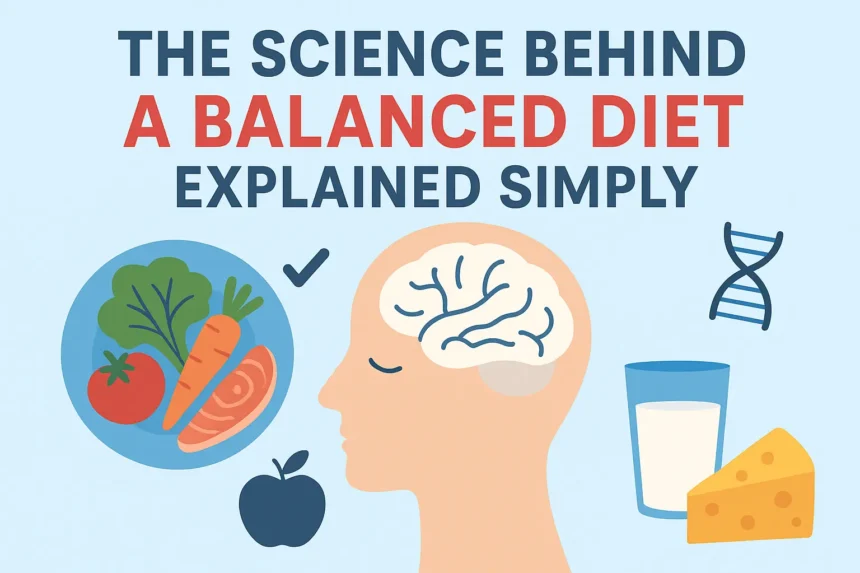When we talk about eating right, the phrase “balanced diet” comes up almost everywhere. But what does it truly mean? The science behind balanced diet isn’t complicated—it’s actually a set of simple principles that help the body work smoothly. If you’ve ever wondered why some foods give you energy while others make you feel sluggish, then you’re already on the path to understanding how it works.
🥦 What is a Balanced Diet in Science Terms?
A balanced diet is the right mix of nutrients—carbohydrates, proteins, fats, vitamins, minerals, and water—that fuel and repair the body. Think of your body as a car. If the wrong fuel goes in, the engine struggles. Similarly, if we only eat one type of nutrient, the body doesn’t perform at its best.
🔬 How Nutrients Work Together
- Carbohydrates: The body’s main fuel. They break down into glucose for energy. (Example: rice, oats, fruits)
- Proteins: Build and repair tissues, muscles, and enzymes. (Example: eggs, beans, fish)
- Fats: Provide energy storage, support brain function, and absorb vitamins. (Example: nuts, olive oil, avocado)
- Vitamins & Minerals: Keep cells healthy, regulate hormones, and protect immunity. (Example: leafy greens, citrus fruits, seeds)
- Water: Helps transport nutrients, maintain temperature, and flush toxins.
👉 Without balance, the body enters “deficiency mode,” leading to fatigue, weak immunity, or poor focus.
⚖️ Why Balance Matters: The Science Explained
- Energy Distribution – Carbs give quick energy, proteins keep you fuller, and fats provide long-term fuel.
- Metabolism Support – Micronutrients like B-vitamins act as spark plugs in metabolism.
- Disease Prevention – A balanced diet lowers risks of obesity, diabetes, and heart problems.
- Brain Function – Omega-3 fats and protein amino acids support memory and concentration.
Have you ever noticed how eating a heavy sugary snack makes you crash later? That’s your body screaming for balance.
🥗 Example: A Day of Balanced Eating
- Breakfast: Oatmeal topped with berries, nuts, and Greek yogurt.
- Lunch: Grilled chicken, quinoa, and a side salad with olive oil.
- Snack: Apple slices with peanut butter.
- Dinner: Baked salmon, brown rice, and steamed broccoli.
Notice how each meal mixes carbs, proteins, fats, and micronutrients? That’s the science in action.
🧾 Science Behind Balanced Diet: Key Takeaways
- The human body works like a chemistry lab, breaking food into usable energy.
- Macronutrients (carbs, proteins, fats) are like building blocks.
- Micronutrients (vitamins, minerals) are the tools that make those blocks work.
- Too much or too little of one nutrient disturbs the body’s natural balance.
🌍 Internal & External Link Suggestions
- Internal: [Balanced Diet Grocery Shopping List for Beginners], [How Balanced Diet Impacts Mental Health and Focus]
- External: CDC – Nutrition Basics | Harvard – Healthy Eating Plate
❓ FAQs (Schema-Ready)
Q1: Why is balance important in diet?
A1: Balance ensures the body gets all nutrients in the right amounts, preventing deficiencies and supporting long-term health.
Q2: What is the scientific definition of a balanced diet?
A2: A balanced diet is the intake of macronutrients (carbs, proteins, fats) and micronutrients (vitamins, minerals, water) in the right proportions.
Q3: Can you stay healthy without fats?
A3: No. Fats are essential for brain health, hormone production, and vitamin absorption.
Q4: How does a balanced diet affect the brain?
A4: Omega-3 fats and proteins improve memory, focus, and mood, while deficiencies can cause brain fog.
Q5: Is eating balanced the same for everyone?
A5: Not exactly. Needs differ by age, activity, and health condition, but the principles remain the same.
The science behind balanced diet is clear: no single nutrient can work alone. Carbs give you power, proteins keep you strong, fats fuel your brain, and vitamins fine-tune your system. The secret is not eliminating, but balancing.
👉 Next time you sit down for a meal, ask yourself: Does my plate have variety and balance? If yes, your body and mind will thank you.
Call-to-Action: Share this post with someone who struggles to eat healthy, or explore our other articles on [Healthwend.com] for more practical tips!


